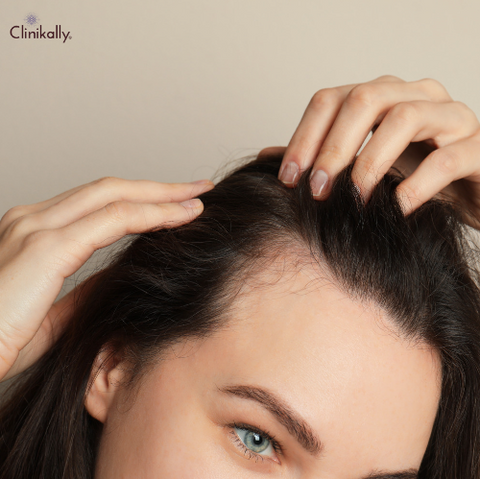A typical preservative used in hair care products to increase shelf life and stop bacterial and fungal growth is sodium benzoate. Regulatory authorities have approved its use, but there is some debate over its possible consequences for health. The advantages of sodium benzoate in hair treatment include preservatives, pH adjusters, and antifungal activities. While sodium benzoate is typically regarded as safe for use in hair care products, it is crucial to use and store any products that include this preservative according to the manufacturer's instructions to prevent any potentially hazardous reactions. It can be advisable to choose natural or preservative-free options if you have sensitive skin or are worried about the usage of preservatives in hair care products.
Understanding Sodium Benzoate

The sodium salt of benzoic acid, a white, crystalline powder that is soluble in water, is sodium benzoate. It is frequently utilised as a preservative in numerous foods, beverages, and cosmetic items, including hair care. By preventing the growth of bacteria, yeasts, and fungus, sodium benzoate prolongs the shelf life of items and helps to avoid spoiling. It is particularly effective against specific bacterial and fungal strains that might lead to foodborne diseases or cosmetic product degradation.
Global regulatory organisations, including the US Food and Drug Administration (FDA), have allowed the use of sodium benzoate in food and cosmetic goods since it is generally regarded as a safe and efficient preservative. However, as was already indicated, when sodium benzoate is coupled with specific other compounds, such as vitamin C, under specific circumstances, there are some worries over the probable creation of benzene. This reaction can be avoided by using the correct product handling and storage techniques. It normally only becomes an issue when products are exposed to intense heat or light.
What is Sodium Benzoate?
Chemically speaking, sodium benzoate is a preservative that is frequently found in food, drink, and cosmetic items. It appears as a white or colourless crystalline powder and is very soluble in water. It is the sodium salt of benzoic acid. The fact that sodium benzoate is effective against a variety of bacteria, yeast, and fungi makes it a widely used preservative. It aids in preventing spoiling and extending product shelf life. It is frequently employed in acidic foods and drinks such as soft drinks, pickles, and fruit juices. It is used to stop the development of bacteria and fungi that might lead to spoilage or product degradation in cosmetics and personal care products.
The US Food and Drug Administration (FDA) has deemed sodium benzoate to be generally recognized as safe (GRAS), and regulatory bodies from all over the world have authorised its usage in food and cosmetic products. However, when ascorbic acid (vitamin C) and sodium benzoate interact under specific circumstances, there have been some worries regarding the probable creation of benzene, a carcinogen. The right handling and storage of items can stop this response.
How Sodium Benzoate Works as a Preservative
As a preservative, sodium benzoate prevents the development of bacteria, yeast, and fungi. To develop and procreate, these microbes need a somewhat acidic environment. Sodium benzoate separates into sodium ions and benzoic acid when it is introduced to a product. The pH inside the microbe cell becomes acidic as a result of the benzoic acid penetrating the cell walls. The bacteria dies as a result of this disruption of its regular metabolic processes. Particularly efficient against bacteria and fungi, sodium benzoate is particularly powerful against microorganisms that thrive in acidic conditions. It is frequently used in products that are acidic, including fruit juices, pickles, sodas, shampoos, and lotions. It is also used in items that are acidic in the cosmetics and personal care industries. Additionally, sodium benzoate is efficient at halting the development of mold and other fungi, which can lead to product spoilage and deterioration. To offer greater protection against bacteria, it is frequently used in conjunction with other preservatives.
Sodium Benzoate in Hair Care Products
Additionally, sodium benzoate is frequently found in hair care products, especially shampoos and conditioners. It works as a preservative to stop the development of bacteria, yeast, and fungi that can lead to product degradation and spoilage. Sodium benzoate also has some additional potential advantages for hair care. Controlling dandruff is one of the advantages of using sodium benzoate in hair care products. A yeast called Malassezia overgrows frequently in areas that are oily or humid, which can result in dandruff. It has been demonstrated that sodium benzoate can prevent the development of this yeast, making it a valuable component in anti-dandruff shampoos. Sodium benzoate also has antimicrobial and antifungal properties that can help keep the scalp healthy and reduce the risk of infection. It can also help to maintain the pH of hair care products, improving their effectiveness and lowering the risk of scalp irritation.
Benefits of Sodium Benzoate for Hair

Sodium benzoate has a number of advantages for hair, especially when it is included in shampoos and conditioners. Here are a few potential advantages:
-
Preservative: Sodium benzoate is a powerful preservative that can help hair care products last longer. It inhibits the growth of bacteria, yeast, and fungi, all of which can lead to product spoilage and degradation.
-
Anti-Dandruff: As previously stated, sodium benzoate can aid in the control of dandruff by inhibiting the growth of the yeast Malassezia, a common cause of dandruff.
-
Scalp Health: Sodium benzoate has mild antimicrobial and antifungal properties that can help keep the scalp healthy and reduce the risk of infections.
-
pH Stabiliser: Sodium benzoate can help to stabilise the pH of hair care products, improving their effectiveness and lowering the risk of scalp irritation.
-
Hair Growth: According to some studies, sodium benzoate may promote hair growth. One study, for example, discovered that combining sodium benzoate and caffeine increased hair follicle growth in vitro.
While sodium benzoate is generally regarded as safe for use in hair care products, some individuals may be allergic to it or other preservatives. If you have any negative reactions to hair care products containing sodium benzoate, stop using them and consult a dermatologist.
Antimicrobial Properties
As was already said, sodium benzoate has antibacterial characteristics, which means it can aid in preventing the development and spread of germs like fungi, yeast, and bacteria. Because of this, it works well as a preservative for numerous food and cosmetic products. Specifically, it has been demonstrated that sodium benzoate is efficient against various microorganisms, including both gram-positive and gram-negative bacteria, as well as several kinds of yeast and fungi. It functions by obstructing the metabolization of specific nutrients by microbes, which finally results in their demise. Sodium benzoate has been researched for its possible use as an antibacterial agent in other applications in addition to its usage as a preservative in foods and cosmetics. It has, for instance, been researched as a potential treatment for urinary tract infections brought on by particular kinds of bacteria.
Scalp Health and pH Balance
The pH balance and health of the scalp can both benefit from using sodium benzoate. The pH of the scalp is naturally approximately 5.5, which is just barely acidic. In order to maintain a healthy scalp and hair, it is crucial to keep the natural microbiome of the scalp in balance. The pH balance of the scalp can occasionally be upset by hair care products, making it overly alkaline. Issues like dryness, itching, and irritation may result from this. The pH of hair care products can be stabilised with the use of sodium benzoate, helping to preserve the scalp's natural pH. This can aid in keeping the scalp healthy and preventing inflammation. In addition, sodium benzoate contains modest antibacterial and antifungal characteristics that may aid in preventing and promoting scalp infections. By preventing the development of the yeast Malassezia, a prominent cause of dandruff, it can also aid in the management of dandruff.
Hair Growth Promotion
While maintaining a healthy scalp and hair follicles is crucial for optimum hair growth, sodium benzoate is not notably renowned for its capacity to promote hair growth. As was already noted, sodium benzoate can assist in preserving the pH balance of the scalp, preventing irritation, and fostering a favourable environment for hair growth. Additionally, it has been demonstrated that sodium benzoate has antioxidant capabilities, which may aid in shielding the scalp and hair follicles from damage brought on by free radicals. Unstable molecules called free radicals can harm cells, including hair follicles, and cause premature hair loss. Additionally, some sodium benzoate-containing hair care products might also include other components that are intended to promote hair growth, like biotin, niacin, and other vitamins and minerals crucial for healthy hair growth. Although additional research is required to completely understand sodium benzoate's effects on hair growth, its potential advantages for protecting hair follicles and maintaining scalp health make it a beneficial element in hair care products.
Safety and Potential Concerns
Numerous regulatory bodies, including the U.S. Food and Drug Administration (FDA) and the European Union (EU), have conducted considerable research on sodium benzoate and determined that it is safe to use in food and cosmetic goods at levels up to 5%. Additionally, the FDA has classified it as generally recognized as safe (GRAS), meaning that it is safe to use in food and food packaging. However, when sodium benzoate is coupled with specific additional substances, such as citric acid or ascorbic acid (vitamin C), there have been some questions raised regarding the possible health effects. These substances may react with sodium benzoate to produce benzene, a recognized carcinogen. However, benzene production is typically seen as having a low risk because this reaction only happens under specified circumstances, such as when the product is exposed to intense heat and light. Furthermore, it should be noted that some individuals may be sensitive to or allergic to sodium benzoate, which can irritate the skin or induce allergic responses. Although uncommon, this is more likely to happen when sodium benzoate is eaten in significant doses as opposed to being administered topically in hair care products.
Side Effects of Sodium Benzoate
The majority of people are typically thought to be safe when using sodium benzoate in cosmetic items in acceptable amounts. However, some individuals may have skin rashes or allergic responses to this component, particularly if they have sensitive skin or if the sodium benzoate-containing product is used on skin that is broken or injured. Skin reactions to sodium benzoate may manifest as a rash, itching, swelling, and redness. Rarely, a severe allergic reaction called anaphylaxis, which can result in breathing problems, swelling of the face, tongue, or throat, and a rapid or weak pulse, can happen. Seek emergency medical treatment if you encounter any of these symptoms.
Benzene production when sodium benzoate is coupled with ascorbic acid (vitamin C) or citric acid, which are frequently used in cosmetic formulations, raises potential safety concerns. However, this reaction is uncommon and typically only happens in certain circumstances, including when exposed to heat and light. Follow the manufacturer's instructions for use carefully to reduce the risk of skin irritation or allergic reactions, and stay away from products containing sodium benzoate if you have known sensitivities to it or other preservatives. Stop using immediately and seek medical advice if you have any negative effects.
Concentration and Formulation Matters
The safety and efficiency of a product can be impacted by the amount of sodium benzoate in it. The sodium benzoate concentration used in cosmetic goods normally ranges from 0.1% to 2%, with larger amounts utilised in items like watery formulations that are more prone to bacterial development. The product's formulation also affects how efficient sodium benzoate is as a preservative. For instance, the sodium benzoate's capacity to prevent bacterial development may be influenced by the product's pH. With a pH of less than 4.5, acidic settings are where sodium benzoate is most effective. As a result, it is frequently used in goods with a low pH, such as shampoos and conditioners.
When sodium benzoate is mixed with ascorbic acid or citric acid, the product's formulation can also have an impact on the likelihood of benzene production. For instance, the likelihood of benzene production can be increased if a product containing sodium benzoate and ascorbic acid is exposed to heat and light. In order to reduce the likelihood of benzene generation, manufacturers may add more preservatives or change the recipe. In order to reduce any potential hazards linked to this ingredient, it is generally vital to pick goods with the right amounts of sodium benzoate and to use them in accordance with the manufacturer's instructions. Consult a dermatologist or a healthcare provider if you have any questions about the efficacy or safety of a product that contains sodium benzoate.
Hair Type and Sensitivity Considerations
Different hair types and scalp sensitivities may react differently to sodium benzoate. If you have a sensitive scalp or skin, it's important to be cautious when using products containing sodium benzoate. You may want to do a patch test on a small area of your skin before using the product on your scalp or hair. If you experience any itching, redness, or irritation, discontinue using the product. In general, sodium benzoate is considered safe for use in hair care products, but some hair types may be more prone to dryness or breakage when exposed to certain preservatives, including sodium benzoate. For example, people with curly or textured hair may be more prone to dryness and breakage, so it's important to choose products that are formulated to provide adequate moisture and nourishment to the hair.
Make sure to select products designed specifically for your hair type if you have colour-treated or chemically processed hair. Although some preservatives might harm or fade the color of chemically treated hair, sodium benzoate is generally regarded as safe for use in colour-treated hair. Consult a dermatologist or a hair care specialist if you are unsure about the effectiveness or safety of a product containing sodium benzoate for your particular hair type.
Natural Alternatives to Sodium Benzoate
There are a number of natural preservatives and alternatives to sodium benzoate that you can use if you prefer hair care products without it. Here are a few possibilities:
-
Essential oils: Many essential oils are natural preservatives and have antimicrobial properties. Tea tree oil, rosemary oil, thyme oil, and lavender oil are a few examples.
-
Vitamin E: As an antioxidant, vitamin E can contribute to the shelf life of hair care products. It frequently functions as a natural preservative in organic skincare and hair care products.
-
Grapefruit seed extract: With its antimicrobial properties, grapefruit seed extract is a natural preservative. It is frequently used to stop bacterial growth in natural hair care products.
-
Citric acid: Citric acid is a weak organic acid that can help to preserve hair care products. It is frequently combined with other natural preservatives to boost its effectiveness.
-
Potassium sorbate: A common preservative in natural hair care products is potassium sorbate, a naturally occurring potassium salt of sorbic acid. It is efficient at preventing the growth of germs and fungi because it possesses antibacterial qualities.
It's vital to remember that natural preservatives might not be as efficient as synthetic ones and might have differing storage and shelf life needs. Always make sure to use natural hair care products within the recommended term by keeping an eye on the expiration date and storage recommendations.
Tips for Choosing the Right Hair Care Products

The health and appearance of your hair might significantly change depending on the hair care products you choose. Here are some recommendations for selecting the best hair care items for your hair type and issues:
-
Determine your hair type: It's important to know your hair type in order to select the appropriate products. Are your locks wavy or straight? Thick or fine? dry or greasy? You can hunt for items designed for your particular hair type once you have a good idea of your hair type.
-
Consider the following hair concerns: Has your scalp become dry and itchy? Do you have thinning or balding hair? Do you wish to tame frizz or accentuate your natural curls? Find items that address the issues with your hair specifically.
-
Read the labels: Look for goods that include healthy, high-quality components like natural oils, proteins, and vitamins. Avoid using products with harsh chemicals or sulphates since they can harm your hair by robbing it of its natural oils.
-
Look for the right pH level: Your scalp has a naturally acidic pH level of around 5.5. Look for hair care products with a pH level in the same range to help maintain the natural balance of your scalp and hair.
-
Consider your lifestyle: If you are active and sweat a lot, look for a gentle shampoo that you can use on a daily basis. If you have colour-treated hair, look for products that are specifically designed to help prevent fading.
-
Don't be afraid to ask for recommendations: If you're not sure which hair care products are best for you, consult with a hair care professional or dermatologist for advice based on your hair type and concerns.
Remember that finding the right hair care products may require some trial and error. Be patient and give each product a chance to work before moving on to the next. And remember to always listen to your hair - if a product doesn't feel right or isn't working for you, it's okay to try something else.
































